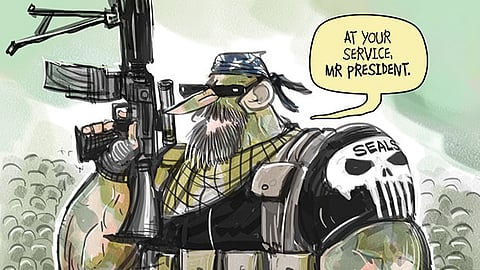A better war strategy
Left unchecked, Daesh could expand into Lebanon, Jordan, Turkey or Saudi Arabia

US President Barack Obama’s strategy in Syria and Iraq is not working. The president is hoping that limited air strikes, combined with US support for local proxies, will “degrade and ultimately destroy” Daesh (Islamic State of Iraq and the Levant). But while US actions may have blunted the expansion of Daesh, they have not shaken the terrorist group’s control of an area the size of Britain. If Obama is serious about dealing with Daesh, he will need to increase America’s commitment well beyond his recent decision to deploy 1,500 more advisers.
What will it take to achieve Obama’s objective?
n Intensify air strikes. When the Taliban lost control of Afghanistan between October 7, 2001, and December 23, 2001 — a period of 75 days — US aircraft flew 6,500 strike sorties and dropped 17,500 munitions. By contrast, between August 8, 2014, and October 23, 2014 — 76 days — the US conducted only 632 air strikes and dropped only 1,700 munitions in Iraq and Syria. Such desultory bombing will not stop such a determined force as Daesh.
n Lift the prohibition on US “boots on the ground”. Obama has not allowed US Special Forces and forward air controllers to embed themselves at the company level and go into combat as they did with the Northern Alliance in Afghanistan in 2001. This lack of eyes on the ground makes it harder to call in air strikes and to improve the combat capacity of US allies. Advisers fighting alongside indigenous troops are far more effective than trainers confined to big bases.
n Increase the size of the US force. The current force, even with the recent authorisation to expand to 3,000 personnel, is still inadequate to counter the 20,000-plus Daesh fighters. Credible estimates of the necessary troop strength range from 10,000 personnel (retired Marine General Anthony Zinni) to 25,000 (analysts Kim and Fred Kagan).
n Send in the Joint Special Operations Command (JSOC). Between 2003 and 2010, JSOC — composed of units such as SEAL Team Six and Delta Force — became skilled at targeting the networks of Al Qaida in Iraq. Its success was due to its ability to gather intelligence by interrogating prisoners and scooping up computers and documents — something that bombing alone cannot accomplish. JSOC squadrons should once again be moved to the region (they could be stationed in Iraq proper, the Kurdish region or Jordan) to target Daesh organisers.
n Do more to mobilise Sunni tribes. Given Shiite militia infiltration, working exclusively through the Iraqi Security Forces would risk empowering the Shiite sectarians whose attacks on Sunnis are Daesh’s best recruiter. The US should directly assist Sunni tribes by expanding the newly established US outpost at Al Asad Air Base in Anbar province, and also increase support for and coordination with the Free Syrian Army and Sunni tribes in Syria. Current plans to train only 5,000 Syrian fighters next year need to be beefed up.
n Impose a no-fly zone over part or all of Syria. Even though US aircraft are overflying Syria, they are not stopping dictator Bashar Al Assad’s forces from bombing rebel-held areas. This has led to a widespread suspicion among Sunnis that the US is willing to keep Al Assad in power — a suspicion fuelled by news that Obama sent a letter to Al Assad’s backers in Tehran proposing cooperation. Sunnis are not going to fight Daesh if the alternative is Iranian domination. A no-fly zone over part or all of Syria would save lives while rallying Sunnis to the anti-Daesh cause, allowing the Free Syrian Army to expand, and possibly paving the way for greater Turkish involvement.
n Prepare now for nation-building. The US should lay the groundwork for a post-conflict settlement in both Iraq and Syria that does not necessarily require keeping both political entities intact. In the Iraqi context, this means offering greater autonomy to the Sunnis (they should be promised Kurd-like autonomy) and guaranteeing the Kurds that their hard-won gains will not be jeopardised. The US should offer to station troops for the long term in the Kurdish area and possibly Anbar, too. Social fragmentation in Syria will make reconstruction there harder. The US goal should simply be to ensure that Syrian territory is not controlled by Shiite or Sunni extremists. The post-war settlement in the former Yugoslavia, which involved the dispatch of international peacekeepers and administrators under United Nations, European Union and Nato mandates, could be a model. This is admittedly an ambitious, long-term goal, but if no such plans are in place, as in Libya in 2011 or Iraq in 2003, failure is guaranteed.
Critics will call this strategy too costly, alleging that it will push the US down a “slippery slope” into another ground war. But while this approach will undoubtedly incur greater financial cost and higher risk of casualties, the present minimalist strategy has scant chance of success and risks backfiring — Daesh’s prestige will be enhanced if it withstands half-hearted US air strikes. Left unchecked, Daesh could expand into Lebanon, Jordan, Turkey or Saudi Arabia, making a major ground war involving US troops more likely. By contrast, this strategy would enhance the odds that the group could be defeated before Obama leaves office.
— Washington Post
Max Boot is a senior fellow at the Council on Foreign Relations. This commentary was adapted from a CFR Policy Innovation Memo.



